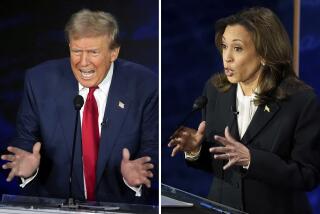Lobbying war launched as Senate begins debate on financial regulation
One of the costliest lobbying wars in memory will crank into high gear this week as the Senate begins debate on the most sweeping overhaul of financial industry regulation in more than half a century.
Wall Street and other critics are flooding the halls of Congress and mounting multimillion-dollar advertising campaigns to argue that the legislation would discourage innovation, reduce profits and harm U.S. competitiveness in the global economy.
The U.S. Chamber of Commerce alone reported spending $30.9 million on lobbying in the last three months, much of it on financial regulation, with major industrial and other corporations weighing in too.
President Obama and congressional Democrats, meantime, are seizing every opportunity to warn that failure to create more effective financial oversight could bring on a repeat of the economic crisis that has cost millions of ordinary people their homes, jobs and financial security.
Treasury Secretary Timothy Geithner, for example, who usually discusses controversial issues in only the most careful, often technical terms, dismissed critics in an unusually blunt manner Friday, saying, “Opponents have tried to convince the American people that these reforms will hurt Main Street or help Wall Street. Those arguments won’t work because they aren’t true.”
The specifics of the proposed regulatory system and the subjects it deals with are arcane — from credit default swaps and derivatives to synthetic collateralized debt obligations.
But the stakes are so high that both sides are going all-out. For critics, that means spending on lobbying and advertising that rivals — or in some areas exceeds — expenditures on the healthcare battle.
Goldman Sachs — the target of government fraud charges — reported spending $1.15 million on lobbying in the first quarter of the year, according to the nonpartisan Center for Responsive Politics — 70% more than in the first three months of 2009.
Hundreds of top corporate executives are flying to Washington to buttonhole home-state senators. Many of the local businessmen are using the same carefully orchestrated message: We had nothing to do with the financial crisis that triggered the recession, but overly broad regulatory proposals could end up costing jobs back home.
To counter the banks and business trade associations, organized labor and consumer groups are also storming the Hill, joining the Obama White House and the Treasury Department in insisting that the Senate legislation not be watered down with exemptions and loopholes as the opposition proposes.
AFL-CIO President Richard Trumka stood outside the Senate chamber on Wednesday urging members to hold firm on the proposal.
That same day, the labor organization claimed to have generated 400,000 calls to Republicans on Capitol Hill supporting the reforms. On Thursday, Trumka led a march on Wall Street.
No battle is likely to be as fierce as the one over the proposed regulation of derivatives, the investment instruments that enabled traders to bet on the prospects of mortgage-backed securities without actually owning the securities themselves. The trading in derivatives earned billions of dollars in profits for Wall Street but also played a central role in the financial crisis.
The legislation pending in the Senate requires that most derivatives be traded on regulated exchanges that would require companies seeking futures contracts to post collateral, much the way investors in the stock market must do when they invest in securities.
Many corporations say that would make it more expensive and less efficient for them to hedge against price fluctuations in energy, raw materials, interest rates and the value of international currency. So-called end users — including companies such as IBM, Boeing, Hess Corp. and FMC Corp. — want an exemption on the grounds that they are not engaged in speculative investing but only protecting themselves against risk.
The Business Roundtable, which represents the CEOs of some of the largest companies, estimates that $33 billion of collateral would have to be posted by nonfinancial companies — an average of $269 million per firm.
“The collateral required of derivatives end users is a direct subtraction from capital they would otherwise use for business investment and job creation,” says Thomas C. Deas Jr., vice president and treasurer of FMC, a major chemical manufacturing company operating in Pennsylvania, Maine and other states.
At the Treasury Department, there is little sympathy for this argument. The Obama administration argues that regardless of motivation, unregulated trading in derivatives is dangerous for the economy as a whole.
“One of the things that has become clear is that we have to bring this market from darkness into light,” said Andrew Williams, a spokesman for the Treasury Department.
More to Read
Get the L.A. Times Politics newsletter
Deeply reported insights into legislation, politics and policy from Sacramento, Washington and beyond. In your inbox three times per week.
You may occasionally receive promotional content from the Los Angeles Times.








